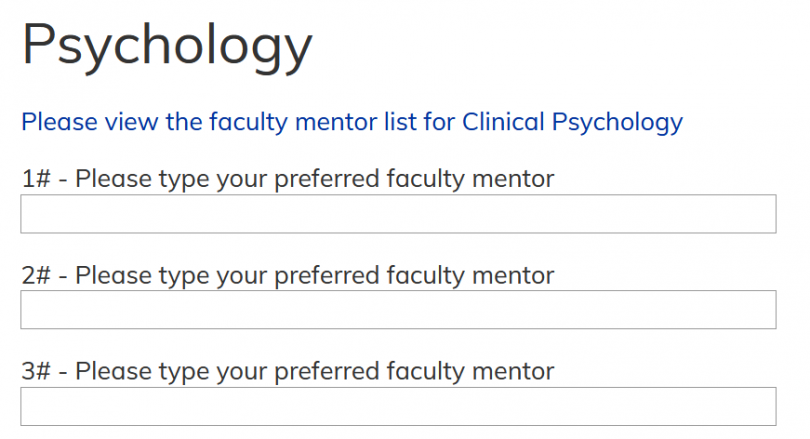Welcome! Thank you for your interest in UK's Clinical Psychology Doctoral Program. In the section below, we have included some tips for completing your application.
Psychology Faculty Reviewing Applications for Fall 2026 Admission
Please note that even applicants who desire a clinical career are still expected to engage in research throughout their predoctoral training, and we ensure this happens by having every student be a member of a research lab. If you think you're a great fit for the UK Clinical Psychology Doctoral Program, but the faculty member with whom you'd like to do research is not one of the people listed on this page, then we encourage you to consider applying next year. Decisions about admission are based on a number of factors, one of which is the "fit" between applicants and faculty mentors, and it wouldn't be in your interest to apply if your prospective mentor is not taking a student this application cycle. You are strongly encouraged to identify a potential faculty mentor (or mentors) as part of the application process, and you should describe the "fit" between your research interests and those of the potential mentors on your personal statement.
Faculty with primary appointments in Clinical Psychology who are reviewing applications for the Fall 2026 cohort and will consider adding a student to their research lab include:
Faculty with primary appointments in the Cognitive Neuroscience and Developmental, Social, and Health Psychology programs occasionally mentor clinical students. The people listed below are reviewing applications for the Fall 2026 cohort, and will consider adding a Clinical Psychology student to their research lab. Prospective Clinical Psychology doctoral students whose research interest align with the individuals listed below may select one or more of these faculty as potential mentors on their application. As would be the case if an applicant desired to work with a Clinical Psychology faculty member, it would be prudent to describe the basis for your interest in these individual's research program on your personal statement.
- Matt Kim (developmental psychologist)
Finally, there are faculty outside the Department of Psychology who are interested in serving as the primary research mentor for clinical psychology students who start in Fall 2026. Clinical psychology students regularly collaborate on research with faculty in neurology, psychiatry, pediatrics, public health, and behavioral science. The individuals outside of psychology who are willing to mentor a new clinical psychology student are listed below and if you are a good fit for their lab, then you should indicate this on your application and in your cover letter.
- Meghan Marsac (pediatric health psychologist)
When completing your online application (log in here), list potential mentors under the "Psychology" section of the application regardless of which department the person actually works (see below).

Special Concentrations
UK's Clinical Psychology program offers two speciality concentrations: 1) Health Psychology and 2) Neuropsychology. These concentrations require additional courses and clinical experiences beyond typical program requirements. Please note that students must be admitted into the Clinical Psychology program, with a primary research mentor, to participate in one of these concentrations (i.e., these are not stand alone programs to which applicants can apply). Students do not need to have a concentration, however (in fact, most don't).
- The goal of the Health Psychology Concentration is to provide a training emphasis in health psychology that, along with the core training provided by the student’s major area of study, leads to the knowledge and applied competencies associated with being a clinical health psychologist.
- The Clinical Neuropsychology Concentration is organized to meet the INS/Division 40 and Houston Conference guidelines for doctoral training in clinical neuropsychology. It is intended to prepare graduate students for an internship in clinical neuropsychology, and ideally a post-doctoral fellowship as well.
For students who are considering the Health Psychology Concentration, we encourage you to review the research programs of affiliated faculty to determine the best fit. UK Psychology faculty who mentor students in our Health Psychology Concentration are: Christal Badour, Jessica Burris, Frances Griffith, Justin Karr, Kate Leger and Marta Stojanovic.
For students who are considering the Neuropsychology Concentration, we encourage you to review the research programs of our faculty to determine the best fit. UK Clinical Psychology faculty who mentor students in our Neuropsychology Concentration are: Jessica Burris, Justin Karr, Michelle Martel, and Marta Stojanovic. Note that although Dr. Karr is the Clinical Neuropsychology Faculty Coordinator, you need not select him as a potential mentor to do this concentration; in fact, if you identify him as your mentor and your research interests do not align with his, you will not be a competitive applicant to our program.
Should applicants interested in our special concentrations identify a potential research mentor? Our program follows a Clinical Scientist model, which means that applicants should apply to UK's Clinical Psychology program because there is a faculty member conducting research in line with their interests. Students in our concentration programs conduct research in their mentor's labs, complete the clinical program's basic requirements, AND complete the additional training required by their concentration. Thus, students primarily hoping to pursue applied training in Health Psychology or Clinical Neuropsychology would still need to identify a potential faculty mentor for their requisite research training. You MUST select a potential mentor on your application in order to receive full consideration for admission into the Clinical Psychology program.
